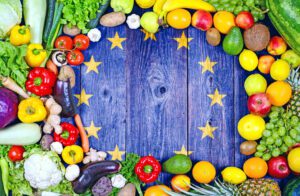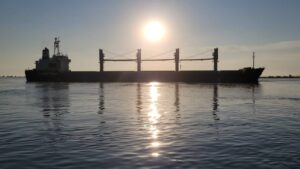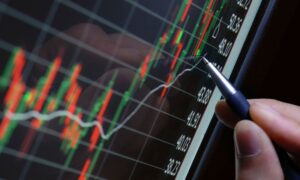
The next four ships with 115 thousand tons of agricultural products left the ports of Chornomorsk and Pivdenny on Wednesday for Africa, Asia and Europe, the Ministry of Infrastructure of Ukraine reports.
“Four ships left the berths, including Magnum Fortune, which transports 51 thousand tons of Ukrainian wheat for Bangladesh, and Almeray with 32.4 thousand tons of corn for Libya,” the agency noted on Facebook.
In total, after the release of the first vessel with Ukrainian food, 5.4 million tons of agricultural products were exported, and the total number of vessels leaving Ukrainian ports for the countries of Asia, Europe and Africa reached 235.
The agency indicated that the day before, the most capacious vessel of the time of the initiative, the Capesize Maran Excellence, with 115,000 tons of grain, left the port of Pivdenny.
As reported, in Istanbul on July 22, with the participation of the UN, Ukraine, Turkey and Russia, two documents were signed on the creation of a corridor for the export of grain from three Ukrainian ports – Chornomorsk, Odessa and Pivdenny.

Exports of organic products from Ukraine to the countries of the European Union and Switzerland in January-June 2022 increased by 19.4% compared to the first half of 2021 – up to 160,020 tonnes from 128,840 tonnes, this happened despite problems with logistics and the blockade of Ukrainian seaports due to full-scale Russian aggression.
According to the website of the information portal OrganicInfo, by the end of 2022, Ukraine is expected to reduce land under organic products due to the temporary occupation of its southern regions. At the same time, in the Ukrainian territories liberated from Russian occupation in early April, the work of organic producers has been almost completely resumed this season.
It is specified that in general, in 2021, Ukraine exported about 260,000 tonnes of organic products for a total amount of about $220 million to more than 30 countries of the world, of which 82% of the revenue came from the EU countries.
“In 2021, Ukraine slightly reduced the volume of supplies of organic products to the EU, but still remains in the TOP 5 largest suppliers of organic products in the EU. In 2021 the total share of Ukrainian imports amounted to 6.6% (of all imports to the EU),” OrganicInfo said.
OrganicInfo is an information portal created by the international charitable environmental organization Green Dossier, which aims to promote organic production, organic food and sustainable lifestyles.

The next four ships with 88.17 thousand tons of agricultural products left the ports of Odessa and Pivdenny on Friday for the countries of Asia and Europe, the Ministry of Infrastructure of Ukraine reports.
“MAINLAND, NEW FAITH, USICHEM departed from the berths of the port of Odessa. From the port of Pivdenny – KARTERIA,” the agency noted on Facebook.
In general, since the launch of the first vessel with Ukrainian food, taking into account today’s vessels, 4.9 million tons of agricultural products have been exported. In total, 222 ships with agricultural products departed from Ukrainian ports, sent to the countries of Asia, Europe and Africa.
As reported, on July 22 in Istanbul, with the participation of the UN, Ukraine, Turkey and Russia, two documents were signed on the creation of a corridor for the export of grain from three Ukrainian ports – Chornomorsk, Odessa and Pivdenny.

Stock indices of the largest countries in Western Europe show weak and multidirectional changes during trading on Tuesday.
The composite index of the largest enterprises in the Stoxx Europe 600 region by 11:27 Moscow time increased by 0.15% and amounted to 413.99 points.
The German DAX indicator rose by 0.07%, the British FTSE 100 – by 0.2%, the Spanish IBEX 35 – by 0.03%. The French CAC 40 fell 0.07%, while the Italian FTSE MIB shed 0.33%.
Traders this week are looking forward to the meeting of the European Central Bank (ECB), which will be held on Thursday. At a meeting in July, the European Central Bank raised rates for the first time in 11 years, by 50 bp at once. The base interest rate on loans was raised to 0.5%, the rate on deposits – to zero, the rate on margin loans – to 0.75%.
The volume of orders of industrial enterprises in Germany in July fell by 1.1% compared to the previous month, the German Ministry of Economics reported.
Analysts on average expected a decline of 0.5%, according to data from Trading Economics. In June, according to revised data, the indicator fell by 0.3%, and not by 0.4%, as previously reported.
Shares of Volkswagen AG rise in price by 2.7%. The German carmaker has confirmed its intention to list the shares of luxury sports car manufacturer Porsche AG. The IPO could be the largest in German history and the largest in Europe since 1999, according to Refinitiv data.
Deutsche Lufthansa AG added 0.3% in price. The German airline will continue negotiations with the pilots’ union to avoid a strike that would lead to the cancellation of numerous flights.
Finnair Oyj’s shares are up 0.5%, although the Finnish carrier cut passenger numbers by 12% in August compared to the previous month.
Among the growth leaders among the components of the Stoxx Europe 600 index are shares of the German food delivery service Delivery Hero SE, which added 7.5%.
In addition, shares of Polymetal International PLC (+7.4%) and British bakery chain Greggs PLC (+6.7%) are steadily rising in price.

The European Medicines Agency (EMA) has recommended the use of Pfizer/BioNTech and Moderna vaccines adapted to protect against the Omicron coronavirus strain, the regulator said on Thursday.
The EMA Medicines Committee has recommended that two vaccines adapted for broader protection against COVID-19 be allowed to be used.
It notes that we are talking about vaccines aimed specifically at protecting against “omicron”.
According to the report, studies have shown that adapted versions of the vaccine “induce a strong immune response against Omicron and the original strain of SARS-CoV-2 in people who were previously vaccinated.”
Now the recommendation of the EMA committee will be sent to the European Commission, which “will make a final legally binding decision applicable in all EU member states”

The composite index of the largest companies in the Stoxx Europe 600 region decreased by 0.57% by 11:32 a.m. and amounted to 417.40 points.
The German DAX fell 0.5%, the French CAC 40 – 0.7%, the British FTSE 100 – 0.6%. The Italian FTSE MIB and the Spanish IBEX 35 were down 0.23% and 0.5% respectively.
Traders evaluate the latest statistics from European countries.
Consumer prices in France, harmonized with European Union standards, rose 6.5% year-on-year in August, according to preliminary data from the Insee National Statistical Office. Thus, the growth rate slowed down compared to 6.8% in July. Analysts had expected weakening to just 6.7%, according to Trading Economics.
Meanwhile, French consumer spending fell 0.8% in July from the previous month. The average forecast of experts assumed a decline of 0.3%, according to Trading Economics. Bloomberg respondents had forecast a 0.2% contraction.
French GDP increased by 0.5% in the second quarter compared to the previous three months, according to final data from the national statistical institute Insee. The final data coincided with the preliminary estimate. Analysts, on average, did not expect a revision, according to a Trading Economics poll.
The number of unemployed in Germany in August increased by 28 thousand – up to 2.497 million, according to the data of the Federal Employment Agency of Germany. The rise in the indicator was noted for the third month in a row.
Unemployment rose to 5.5% from 5.4% a month earlier.
Experts polled by Bloomberg predicted, on average, an increase in the number of unemployed by 28.5 thousand and a rise in the unemployment rate to 5.5%. Respondents of Trading Economics assumed an increase in the first indicator by 28 thousand and an increase in unemployment to 5.5%.
The drop leaders among Stoxx Europe 600 components are shares of the Polish supermarket chain Dino Polska, which shed 4.3%.
Airbus SE shares are down 1.9%. European Aerospace Corporation CFO Dominic Asam will leave his post in early March next year, the company said in a statement. He will take the position of CFO of SAP SE.
Danske Bank AS added 0.4% in price. A Danish bank will write off the debt of 90 thousand customers in connection with the discovery of errors in debt collection systems.